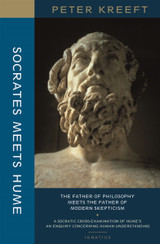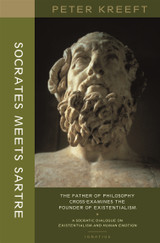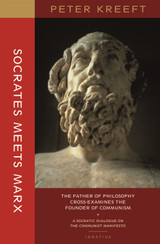Product Overview
The greatest teacher of philosophy in all of history was Socrates, according to philosopher Peter Kreeft. In 2,400 years, no one has topped him or his Socratic method, teaching not by monologue, but by dialogue; not by lecturing, but by logical questioning. Yet of the hundreds of textbooks for beginning philosophers today, none uses his method.
Kreeft has imagined Socrates University: a log, with Socrates at one end and a typical intelligent modern student beginner at the other, conversing about the problems at the heart of each major division of philosophy.
Nothing teaches more effectively than concrete examples and apprenticeship. Like the real Socrates, this fictionalized version by Kreeft is grounded in common sense and commonsense logic, fair and open-minded on all issues but demanding good reasons for every opinion.
Editorial Reviews
“Even though I’ve never taken a class from Peter Kreeft, I have been a student of his since I came across his books when I was an undergraduate. He taught me how to think like a philosopher. This book provides us with the sort of accessible, rigorous, and eminently readable introduction to philosophy that drew me to his work decades ago. I cannot wait to use it as a required text in my own introductory course.”
—Francis J. Beckwith, Professor of Philosophy, Baylor University
“Aristotle argued that philosophy was inevitable, because even to ask whether philosophy was inevitable was to engage in philosophy. Now comes Professor Kreeft showing how all the big questions in philosophy arise inevitably—and some big answers too. This delightful book will help not simply students but also teachers rediscover the intellectual curiosity they had as a child.”
—Michael Pakaluk, Professor of Ethics and Social Philosophy, The Catholic University of America
“Kreeft’s long experience as a scholar, thinker, and teacher is evident throughout these lively conversations between the immortal Socrates and we mere mortals, who are intrigued by the possibilities of knowing the truth and loving wisdom. This book merits careful and multiple readings and would work well as a conversation starter in classrooms.”
—Fr. Robert McTeigue, S.J., Author, Real Philosophy for Real People
“Lots of people have written phony Socratic dialogues. Since Socrates, hardly anyone gives us the real thing – but Kreeft does. There is nothing stiff or ‘cooked’ about these dialogues. They aren’t treatises or polemics in disguise, but quests for the legendary beast called truth. Though fun to read, they require courage too, because they follow the arguments wherever they lead. Like diving into the ocean and swimming with all your might, you don’t know where you’re going until you get there. Philosophy began in dialogue; why shouldn’t philosophical beginners read dialogue? Wonderful stuff.”
—J. Budziszewski, Professor of Philosophy, University of Texas, Austin; Author, What We Can’t Not Know











